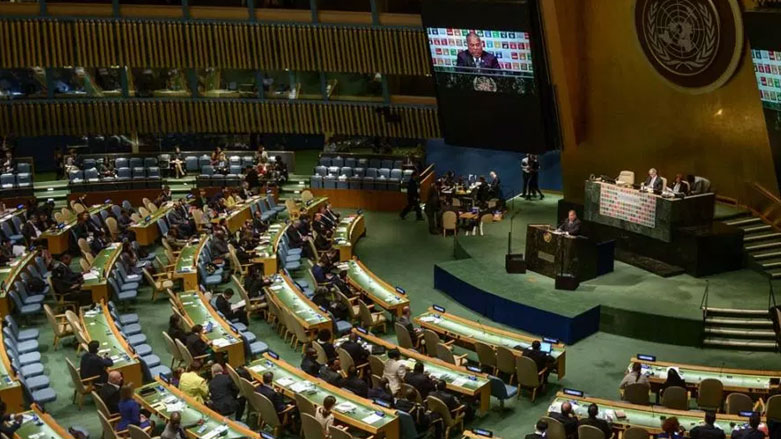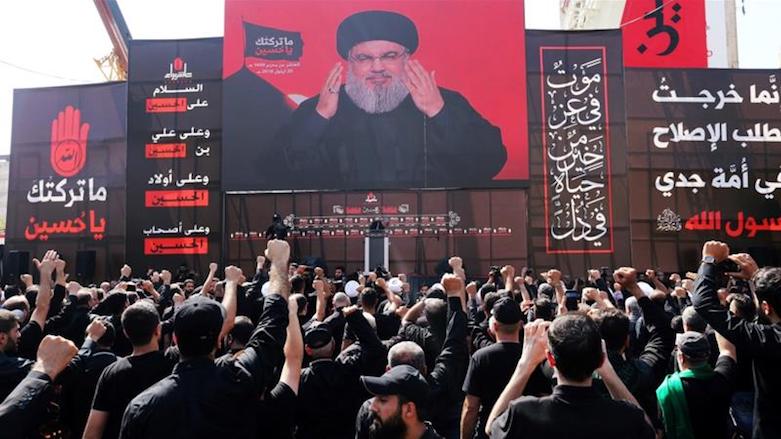US to stress weapons of mass destruction threat, including Iran and Syria, at UN

WASHINGTON DC (Kurdistan 24) - State Department Spokesperson, Heather Nauert, explained on Thursday that the spread of weapons of mass destruction, along with their delivery systems, will be a top US concern next week, as the UN General Assembly begins its annual session.
“First” among our priorities, Nauert stated, “is addressing the global threat posed by weapons of mass destruction.”
“That includes the proliferation of chemical, biological, and nuclear weapons, as well as ballistic missiles,” she explained.
President Donald Trump “intends to chair a UN Security Council meeting on that issue,” Nauert continued, as she identified Iran, Syria, and North Korea as countries of particular concern.
Since May, when the Trump administration left the Iranian nuclear deal, that country has figured prominently in US national security policy.
Nauert denounced the Iranian regime for attacking US and Kurdish targets earlier this month as she responded to a question about reports in the Arab media that the US had told the Iraqi government it would hold Baghdad responsible for any harm to US personnel or facilities.
Nauert’s answer appeared a decisive no, as she affirmed, “We have a terrific relationship with the Iraqi government.”
Contrary to the peculiar Arab media reports, it is the Iranian regime which the US will hold responsible in the event of harm to US personnel or damage to its facilities, as the White House warned on September 11.
Perhaps, notably, there have been no further attacks since then, whether carried out directly by Iran or, indirectly, through its proxies.
Nikki Haley, US Ambassador to the UN, similarly denounced Iran at a Security Council meeting on Thursday, charging that Tehran “has trampled on the sovereignty of its neighbors,” including Iraq, where it “has shown a total disregard of the sovereignty of a country that is at a critical stage in its political development.”
“Iran’s leaders pretend” they are motivated to intervene in other countries “in the name of religious affiliation,” but they are really “interested in power,” Haley stated.
Or as Entifadh Qanbar, an Iraqi-American who heads the Future Foundation in Washington, put it to Kurdistan 24, “It is about ruling, not praying.”
“In recent months,” Haley noted, “Iran’s aggression has escalated.” Tehran has begun to transfer ballistic missiles to proxies in Iraq, and it “attacked the headquarters of the Kurdistan Democratic Party of Iran, killing eleven people.”
She explained that Qasim Soleimani, head of the Quds Force of Iran’s Islamic Revolutionary Guard Corps (IRGC) “is leading an effort to influence the composition of a new Iraqi government.”
But “I remind my colleagues,” Haley stated, “Soleimani was banned from traveling outside of Iran by the Security Council in 2007,” as she added a new, and particularly timely, count to the US charges against Iran for violating UN resolutions.
“That ban was reaffirmed in 2015 with the passage of Security Council Resolution 2231,” she said.
“Despite this unambiguous travel ban, Soleimani has practically taken up residence in Iraq” since the May 12 elections. “This fact was noted by the Secretary-General in the most recent 2231 implementation report,” Haley explained.
Of course, had the Security Council enforced its ban on Soleimani’s travels, Iraq’s political scene today might well look significantly different.
So, too, might Syria’s. Soleimani visited Moscow in July 2015 and played a key role in arranging Russia’s intervention two months later, which turned the tide in Syria’s civil war.
As Reuters reported, “Soleimani’s visit to Moscow was the first step in planning for a Russian military intervention that has reshaped the Syrian war,” forging “a new Iranian-Russian alliance in support of [President Bashar al-]Assad.”
At Thursday’s State Department briefing, Kurdistan 24 also raised a different issue: the crisis in providing support for the 1.5 million refugees and Internally Displaced Persons (IDPs) in the Kurdistan Region.
The Joint Crisis Coordination Center (JCCC) of the Kurdistan Regional Government (KRG) has issued an urgent appeal for increased humanitarian assistance for the refugees and IDPs.
As the JCCC statement noted, more refugees and IDPs are entering the Kurdistan Region than returning home, but international support is falling far short of the need.
“The humanitarian situation itself” is a “consequence of a complex, economic, political, social, legal, and security crisis that has produced far-reaching destruction in the communities” from which the displaced people come and prevents the majority of them from “returning to their homes in the liberated areas,” the statement explained.
“Alarmed by the threat to the welfare and food security of displaced populations,” the KRG calls upon the “federal government and the international community to prevent a potential humanitarian tragedy by allocating needed resources.”
“Without additional funding,” the KRG and its partners “will not be able to cope with the pressure,” the statement warned.
The Trump administration has been cutting back on assistance to humanitarian programs in various places: Syria, the Palestinian territories, and Iraq itself, to name three. Nauert was unaware of the details of US support for humanitarian needs in the Kurdistan Region but did say she would look into it.
Editing by Nadia Riva

